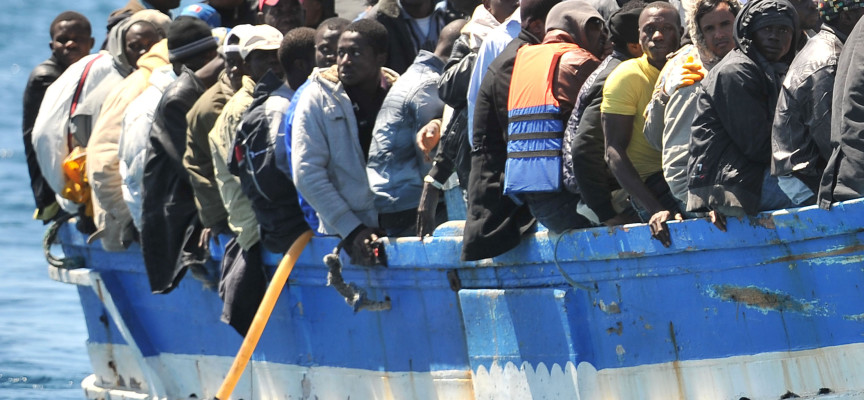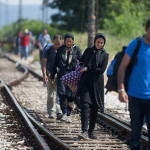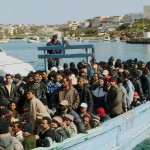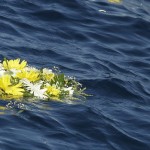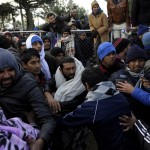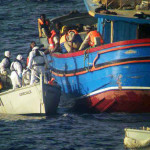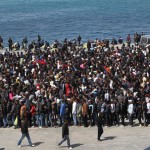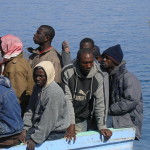The sinking of Sept. 12, caused by the smugglers, which destroyed the lives of nearly 500 people in the Mediterranean Sea, was “one of the worst” accidents in recent years, according to the International Organization for Migration (IOM).
Meanwhile – a sign that candidates to leave Africa are more and more numerous – the Italian Navy reportedly rescued nearly 2,380 people last weekend, in the framework of the ‘Mare Nostrum’ programme.
Near Calais, in the Pas de Calais region in France, the many exiles who have been living for more than twelve years in precarious and humiliating conditions highlight the problem of the presence of foreigners on our territory.
These people who have fled war, persecution, and poverty, are now living on the north coast of France in the hope of building a future. A hope which is faced with an extremely violent reality: institutional mistreatment, the clear will to make them invisible, humiliation, dehumanizing living conditions, Kafkaesque European laws in the name of which people are being made bouncing as objects, as if they were the “hot potatoes of Europe”.
In Calais, a good number of people are refusing to reduce the presence of foreigners to an issue to be dealt with exclusively in terms of flow management.
Among them, many Christians, for whom the encounter with the exiles is first and foremost an encounter with a brother, an encounter with Christ: “I was a stranger and you welcomed me” (Matthew 25).
Although they are aware of the complexity of the migration issue, these Christians know that the ideal of free movement of people is a key objective, but given the current social and economic reality, it is not feasible in the short term.
First of all, they consider the encounter with the stranger, with the “clandestine,” as an encounter with a brother who invites us to change our vision. They reject the idea that the presence of migrants and asylum seekers is a problem, so they forget about listening to their stories, to the causes that made them leave everything behind. These Christians, however, have decided to meet other people in a different way. They try to live this encounter in truth, thus experiencing a possible way of living together.
Being actors in a more fraternal world is not an ideological position. It is enacted through concrete commitments, through a daily attitude which is anchored into the very essence of the Gospel message.
In the light of the experience of the network of Secours Catholique in Pas de Calais, through ten years of presence at the side of the exiles of Calais, we too must, no doubt, answer every now and then to the question: “What have I done with my brother?”.
Le 12 septembre dernier, un naufrage provoqué par des passeurs a fait jusqu’à 500 morts en Méditerranée, ce qui en ferait ”l’un des plus graves” depuis des années, selon l’Organisation internationale pour les migrations (OIM).
Dans le même temps, signe que les candidats au départ sont toujours plus nombreux, la marine italienne a rapporté lundi avoir secouru quelques 2 380 personnes au cours du week-end, dans le cadre du programme “Mare Nostrum”.
À proximité de Calais, sur le Calaisis, depuis plus de douze ans, les nombreux exilés vivants dans des conditions précaires et indignes posent la question de la présence d’étrangers sur notre territoire.
Ces personnes fuyants la guerre, la persécution et la misère, sont présentes sur le littoral du nord de la France dans l’espoir de se construire un avenir. Leur espoir se confronte à une réalité extrêmement violente : maltraitance institutionnelle, volonté de les rendre invisibles, humiliations, conditions de vie déshumanisantes, règlements européens kafkaïens au nom duquel on se renvoie les personnes comme des objets, comme les “patates chaudes de l’Europe”…
À Calais, bon nombre de citoyens refusent de réduire la présence des étrangers à un problème qu’il s’agirait d’aborder uniquement en terme de gestion des flux.
Parmi eux, de nombreux chrétiens, pour qui la rencontre de l’exilé est d’abord rencontre d’un frère, rencontre du Christ : “J’étais un étranger et vous m’avez accueilli” (Mat 25).
Conscients de la complexité des questions migratoires, ces chrétiens savent que l’idéal de la libre circulation des personnes est un objectif à atteindre, mais qu’au vu des réalités sociales et économiques actuelles il n’est pas réalisable à court terme.
Avant tout, ils voient dans la rencontre de l’étranger, du “sans papier”, la rencontre d’un frère qui nous invite à changer notre regard. Ils rejettent l’idée que la présence des migrants et des demandeurs d’asile est un problème, en oubliant d’écouter leur histoire, d’écouter les causes qui les ont fait tout quitter. Alors ces chrétiens font le choix de la rencontre avec l’autre différent. Ils tentent de vivre cette rencontre en vérité, expérimentent que vivre ensemble est possible.
Être acteurs d’une planète plus fraternelle n’est pas une position idéologique, cela passe par des engagements concrets, par une attitude quotidienne ancrée dans ce qui fait l’essence même du message évangélique.
À la lumière de l’expérience du réseau du Secours catholique du Pas-de-Calais, à travers dix années de présence auprès des exilés du Calaisis, nous devrions sans doute, nous aussi, nous reposer de temps en temps la question: “Qu’ai-je fait de mon frère?”.
Le patate bollenti dell’Europa
Il naufragio del 12 settembre scorso, provocato da scafisti e costato la vita a quasi 500 persone nel Mediterraneo, è stato “uno dei più gravi” degli ultimi anni, secondo l’Organizzazione internazionale per le migrazioni (Oim).
Allo stesso tempo, segno che i candidati alla partenza sono sempre più numerosi, la Marina militare italiana ha dichiarato di aver soccorso quasi 2.380 persone nell’ultimo fine settimana, nell’ambito del programma “Mare Nostrum”.
Nei pressi di Calais, nella regione Passo di Calais in Francia, i numerosi esiliati che da più di dodici anni vivono in condizioni precarie e indegne pongono il problema della presenza degli stranieri sul nostro territorio.
Queste persone che sono fuggite da guerra, persecuzione e miseria, vivono sul litorale Nord della Francia nella speranza di costruirsi un avvenire. Una speranza che si scontra con una realtà estremamente violenta: maltrattamento istituzionale, volontà di renderli invisibili, umiliazioni, condizioni di vita disumanizzanti, leggi europee kafkiane in nome delle quali ci si rimbalza le persone come oggetti, come fossero le “patate bollenti dell’Europa”.
A Calais, un buon numero di persone rifiuta di ridurre la presenza degli stranieri a un problema da trattare unicamente in termini di gestione dei flussi.
Tra questi numerosi cristiani, per i quali l’incontro con l’esiliato è innanzitutto incontro con un fratello, un incontro con Cristo: “Ero straniero e mi avete accolto” (Mat 25).
Coscienti della complessità della questione migratoria, questi cristiani sanno che l’ideale della libera circolazione delle persone è un obiettivo da perseguire, ma che viste le realtà sociali ed economiche attuali non è realizzabile nel breve termine.
Prima di tutto, essi vedono nell’incontro con lo straniero, con il “clandestino”, l’incontro con un fratello che c’invita a cambiare il nostro sguardo. Essi rifiutano l’idea che la presenza dei migranti e dei richiedenti asilo sia un problema, dimenticando di ascoltare la loro storia, le cause che hanno fatto loro lasciare ogni cosa. Questi cristiani, invece, scelgono d’incontrare l’altro diversamente. Essi tentano di vivere questo incontro nella verità, sperimentando un vivere insieme possibile.
Essere attori di un pianeta più fraterno non è una posizione ideologica, ma passa attraverso impegni concreti, attraverso un’attitudine quotidiana ancorata in quella che è l’essenza stessa del messaggio evangelico.
Alla luce dell’esperienza della rete del Secours catholique di Passo di Calais, attraverso dieci anni di presenza presso gli esiliati di Calais, dobbiamo anche noi, senza dubbio, rispondere ogni tanto alla domanda: “Che ne ho fatto di mio fratello?”.
Mgr. Jean-Michel di Falco Léandri
Évêque de Gap et d’Embrun (France)
Latest posts by Mgr. Jean-Michel di Falco Léandri (see all)
- The dust of Europe and the dust of Africa - 20 febbraio 2016
- The drama becomes a spectacle - 30 aprile 2015
- Easter: the Risen and disorder in the world - 4 aprile 2015

